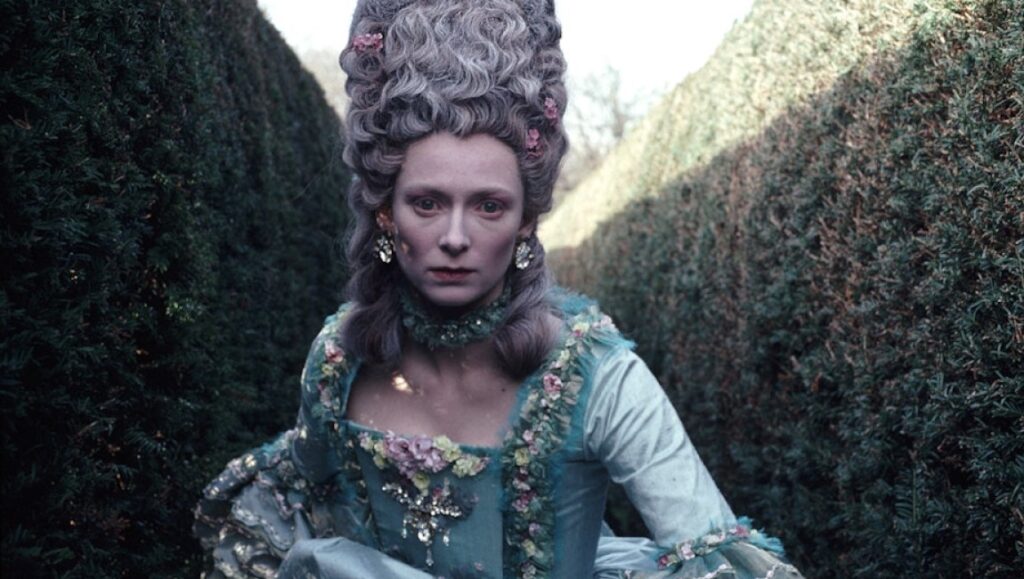“Do not fade. Do not wither. Do not grow old.” That is the command Orlando (Tilda Swinton) first receives from Queen Elizabeth (Quentin Crisp), who offers the young man great wealth, in the way a fairytale witch offers a child sweets. Orlando’s curse is to live for centuries without aging, but one day become female and unable to hide this change. British filmmaker Sally Potter’s adaptation of Virginia Woolf’s 1928 novel/love letter (a literary gem inspired by Woolf’s lover, Vita Sackville-West) uses these gender-creative casting choices as a starting point for more loosely exploring the story as an odyssey, employing a grandly visual adaptation to detail Orlando’s imprisonment within and escape from the confines of sex. The director strays from the text, allowing anachronistic literary references to bleed in (England is William Blake’s “green and pleasant land” in the 18th century). Similarly, this fluidity of history lends itself to Orlando’s fuzzy, ever-fading biography when the writer takes their life story to a publisher near the end.
“How long did this take you?” the publisher asks. No number would offer the right answer. Having been born again in the same body (spare some changes) with the same soul (spare none), while entering politics in the Middle East, Orlando’s first homecoming is a public fall from grace. All that changes is the sex of who was once a landowning man, and yet all of Orlando’s past is sullied in society. Orlando can reenter the upper classes, but this time without power (unless it comes through a male lover, who eventually comes, played by Billy Zane) and under the constant eye of those who would have been her peers a century ago. The curse of eternal youth is the curse of eternal suppression; Orlando’s quasi-vampire fable (unrelenting sameness, struggles with a reflection of the self) would not be complete if not eternally rendered childlike by femininity.
Unlike other adaptations of Woolf’s novel — Paul B. Preciado’s recent Berlinale premiere Orlando, My Political Biography related the experience within to a legion of transmasculine subjects; forty years earlier, German avant-garde feminist Ulrike Ottinger’s Freak Orlando retained only the notion of an ideal genderfluid protagonist — Potter’s version is deeply entrenched within its time and place. Postmodern interpretations of Orlando focus on the universality of its gender nonconformity, whereas the 1992 film respects the specific barriers of the setting. As compared to now, Woolf’s novel comes from an epoch of distinctly gendered subjugation, as do all of the times Swinton’s Orlando lives through. Though the era of the novel’s publication (the late-1920s) is far removed from the Elizabethan beginnings of the story, the dynamics of gender have hardly changed when it comes to who has the upper hand.
Nothing is so fluid as time. Orlando enters a garden labyrinth in one era, and leaves in another. The costumes change; a bustle slims down, the padding is pulled out from beneath a layer of corsets, and the colors become darker, but the weight of the fog is never any lighter. Starched wigs and drawn-on moles pepper the crowds in one era, while equally stiff-pinned styles sketch out another — the rate at which these trappings of gender performativity change is alarmingly slow. In many contemporary period pieces (i.e., Bridgerton), the corset is a simple shorthand for a female character to express frustration with her subjugation. Despite most styles leaning toward short stays as simply a supporting garment, or tightlacing falling out of fashion whenever the film is set, the use of the corset as a historical marker of physical pain innate to gender is a common anachronism to give women something to voice their frustrations against.
But in Orlando, this depiction works. The character’s palpable distress feels more akin to our modern concept of gender dysphoria than it does to any historical “girl power” throwaway treatment because Orlando has lived as a man. This character has tasted freedom, and, yes, found restriction within it in other ways, but had primarily lived out their years without suffering from second-class status. The symbols of womanhood, particularly those of false wealth — in the past, Orlando can only own land as a man; when their sex changes, wealth becomes an illusion — feel more substantial. As a court of gentlemen muse over their wives’ lack of merits, the camera swings slowly around the circle, with Swinton’s back on screen but out of focus, for 30-odd seconds. We receive the aftermath of her discomfort at these gendered moanings, but we do not get to react with her. Her dismay at falling out of their graces is only recorded, and thereby shown to the audience, once she is disesteemed for no longer remaining silent, relegating her to the status of nagging wife or court decoration.
Rather than end in Woolf’s own time, just as she places down the pen, the film ends with Orlando gazing upon her daughter, who holds a camera. The girl playfully runs through a field, and the camera moves in her young and unsteady hands. Now, the camera takes the place of the pen, and Orlando’s fourth-wall break operates the same as Woolf’s aside to the reader: the young girl is able to write her own story. The film ends nearly seventy years after the novel — England has gone to war, man has touched the stars, and the expanse of human knowledge is at our mere fingertips. The lens lingers on Swinton’s face in the coda, and her eyes alone convey the breadth of so many stories, reflecting lifetimes we haven’t even seen her live. In solitude she looks to the sky, gazing up to the angels who share the freedom she has found in this moment.
Part of Kicking the Canon — The Film Canon.
Published as part of InRO Weekly — Volume 1, Issue 23.


Comments are closed.